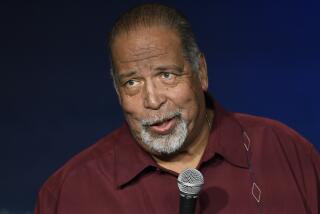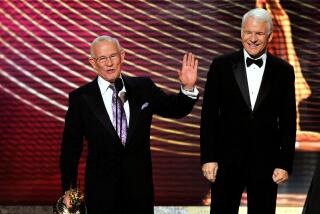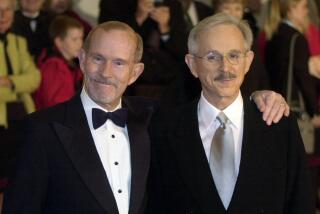Pat Paulsen; Comic Parodied Politics
Pat Paulsen, whose sallow, hangdog, deadpan face became a national treasure on “The Smothers Brothers Comedy Hour” and in his perennial mock campaigns for president of the United States, has died. He was 69.
Paulsen died Thursday at an unknown site in Mexico where he had gone for alternative treatment of inoperable colon and brain cancer. The comedian’s publicist Glenn Schwartz, in announcing the death Friday, said Paulsen died of pneumonia and kidney failure after recent surgery to remove “adhesions” left by a previous surgery. The Paulsen family said the cancer had been under control, and Paulsen’s wife, Noma, praised his care by Mexican doctors.
With his droll commentary on current events, Paulsen graced the satirical Smothers Brothers show from its inception in 1967 until CBS kicked the series off the air in 1969 because of its politically controversial content. The other major networks gave the popular show brief airings; ABC in 1970 and NBC in 1975.
“He was a dear friend, and a great part of the Smothers Brothers’ success was due to him,” Tom Smothers said Friday. “He was one of the great comedians of our time.”
At the suggestion of Tom and Dick Smothers, Paulsen declared himself a candidate for president in 1968 in order to parody political campaigns. Playing on his loser persona, he never let mere trouncing discourage him from running again and again and again.
When Paulsen could no longer tout his campaign rhetoric on the Smothers’ show, he took it back to the comedy club stage.
He also infiltrated real candidate entourages--never failing to draw news media like a magnet. Weary of humdrum political speeches, an eager press corps devoured the free comic relief he offered.
For example, Paulsen would mysteriously appear, quietly sitting, in the back seat of a bus roving the state in former Assembly Speaker Jesse M. Unruh’s ill-fated 1970 gubernatorial campaign. Cynical reporters vied to unmask his act, but Paulsen never cracked a smile and never fell out of character.
He told all and sundry that he was running on the STAG ticket, an acronym for Straight Talkin’ American Government. He proposed semi-plausible causes such as “raising funds and organs” for the American Diabetes Society. But winning the pledge of U.S. Sen. Alan Cranston, himself a presidential candidate in 1983, the dour Paulsen sweetened the deal with the bald politician: “Maybe we can trade a kidney for a hair transplant.”
Paulsen considered his 1992 presidential campaign his most successful, toting up 800 votes in New Hampshire, where he shadowed George Bush; 1,500 in Louisiana, where he never even campaigned; and 5,000 in Kansas, where he spent only two days.
“If you win,” he explained to The Times in 1993 about his tireless campaigning, “you get the pension, you know, and the guard and everything--what more could a person ask for? [But] I wouldn’t hang around Washington. Presidents tend to tinker, you know, and mess everything up.”
Paulsen came late to his comedy career after a string of jobs that included clerk, truck driver, hod carrier, Fuller Brush salesman and gypsum miner. Born in a fishing village in the state of Washington, he grew up in California and joined the Marines in World War II.
Eventually Paulsen attended San Francisco City College, where he joined an acting group called the Ric-y-tic Players. He later performed with his brother, Lorin, then went solo during the folk club craze in the early 1960s.
The comic performed in such venues as the Ice House in Pasadena, the Troubadour in Los Angeles, the Gaslight in New York and the Purple Onion in San Francisco, where he met the Smothers Brothers.
Paulsen said he expected to make “a pile of money” by selling the brothers a couple of his songs, but they gave him only $40. They later hired him for their national television show, he insisted, because he would sell them cheap songs and run errands.
He won an Emmy for that show in 1968, and recently won the Platform Assn.’s prestigious Mark Twain Award for his body of work in comedy.
In addition to occasional work in clubs, Paulsen regularly spent summers in Muskegon, Mich., producing and starring in repertory plays at the Cherry County Playhouse.
He also produced award-winning wines at his Sonoma County winery north of San Francisco from 1980 until he lost the property when divorcing his second wife in 1992.
Besides his wife, Noma, and brother, Lorin, Paulsen is survived by three children, Terri, Monty, and Justin, and a sister, Norma.
The family has asked that any memorial donations be made to the Pat Paulsen Trust Fund, c/o Neal Levin and Co., 9595 Wilshire Blvd. Suite 505, Beverly Hills, CA 90212, to defray Paulsen’s medical expenses.
More to Read
The complete guide to home viewing
Get Screen Gab for everything about the TV shows and streaming movies everyone’s talking about.
You may occasionally receive promotional content from the Los Angeles Times.






